Authors: Sohee Kim and Ahjung Lee
English | 한국어
Seoul, Republic of Korea — “Fulfilling all you can be.” This was a common message of women leaders who spoke at ‘1st Seoul Gender Equality Dialogue: Breaking Gender Barriers for a Better Future of Key Industries,’ organized by the UN Women Centre of Excellence for Gender Equality (the Centre) in the Republic of Korea on November 2. With some 300 people attending, the event presented inspiring stories from trailblazing women in the fields of infrastructure, technology and finance, who have broken glass ceilings and now serve as role models for upcoming women and girls.
Sujin Ahn, Corporate Executive Vice President of the Memory Business Division at Samsung Electronics, recounted her experience some 20 years ago in confronting co-workers’ skepticism over her future potential, "People seemed to wonder if a woman engineer could really create value and thrive in the semiconductor industry." As she added with pride, "I believe that we, both those who came before and those currently in the field, have successfully dispelled that doubt."
Joining Samsung Electronics in 1999, Ahn played a pivotal role in the research and development of Samsung’s cutting-edge memory technology including DRAM, Flash, MRAM, PRAM, and 3D V-NAND products. She therefore contributed to Samsung’s current position as the industry leader for 20 consecutive years.
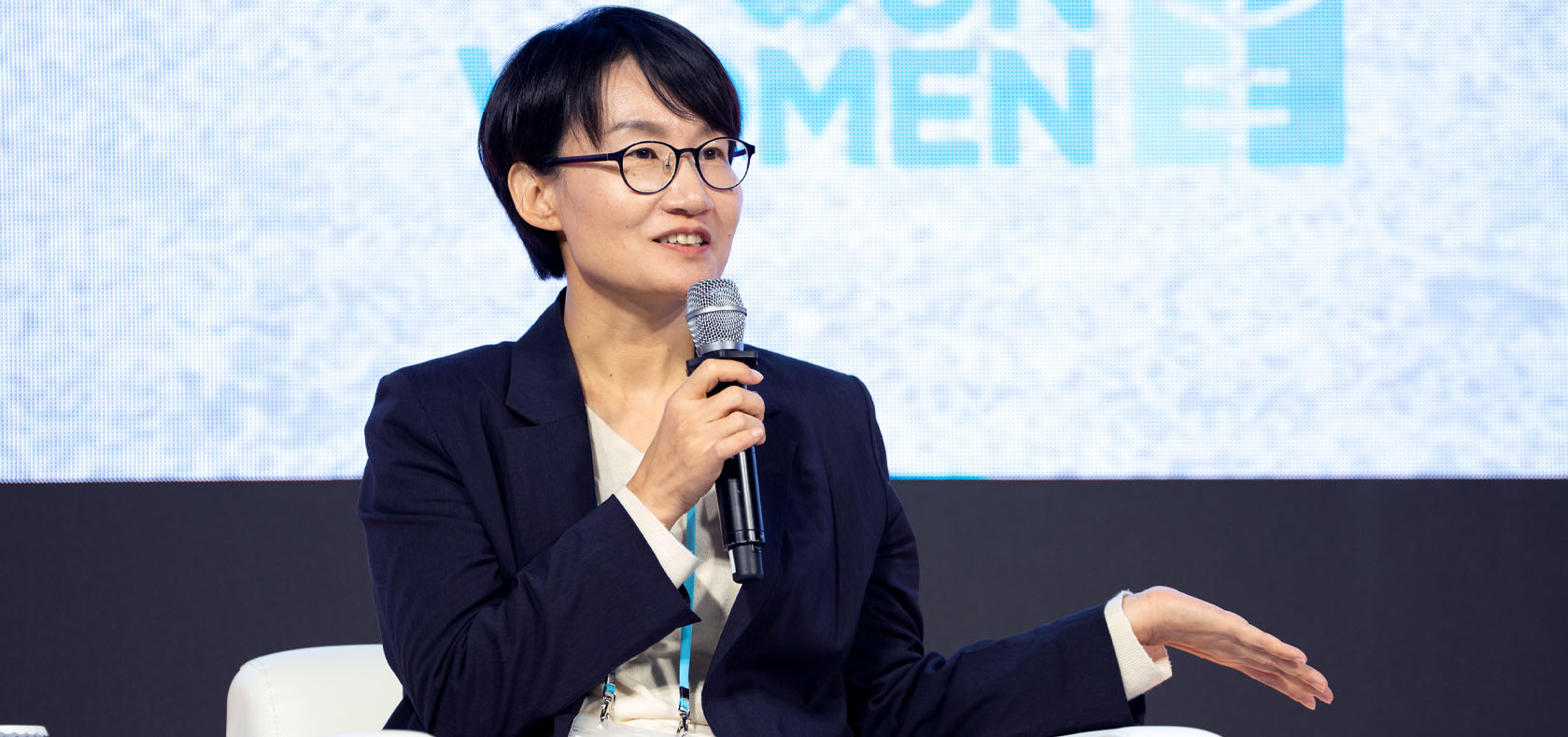
Sujin Ahn, Corporate Executive Vice President of the Memory Business Division at Samsung Electronics at the 1st Seoul Gender Equality Dialogue. Photo: UN Women/Hanju Lee
Addressing the concerns of other women, Ahn advised younger professionals to focus on maximizing their strengths and unique capacities rather than their deficiencies. "We all bring different things to the table—technical expertise, hands-on experience, work methods, thought processes, and even each individual’s home and social environment,” she explained. “I've leveraged my expertise in electrical engineering and focused on theoretical research and integration of new technologies. Thanks to this approach, I've built a distinctive career in developing various memory products […and] contributing to my company’s success in my own way.”
This advice from Ahn was then echoed by Diane Lin, Head of Investment for the Indo-Pacific and Middle East, Department for Business and Trade for the government of the United Kingdom. "My advice is that you shouldn’t be overly concerned with what others say. Instead, do what you believe is best for yourself, taking into account your own desires and interests. Choose the path that resonates most with you,” she counseled.
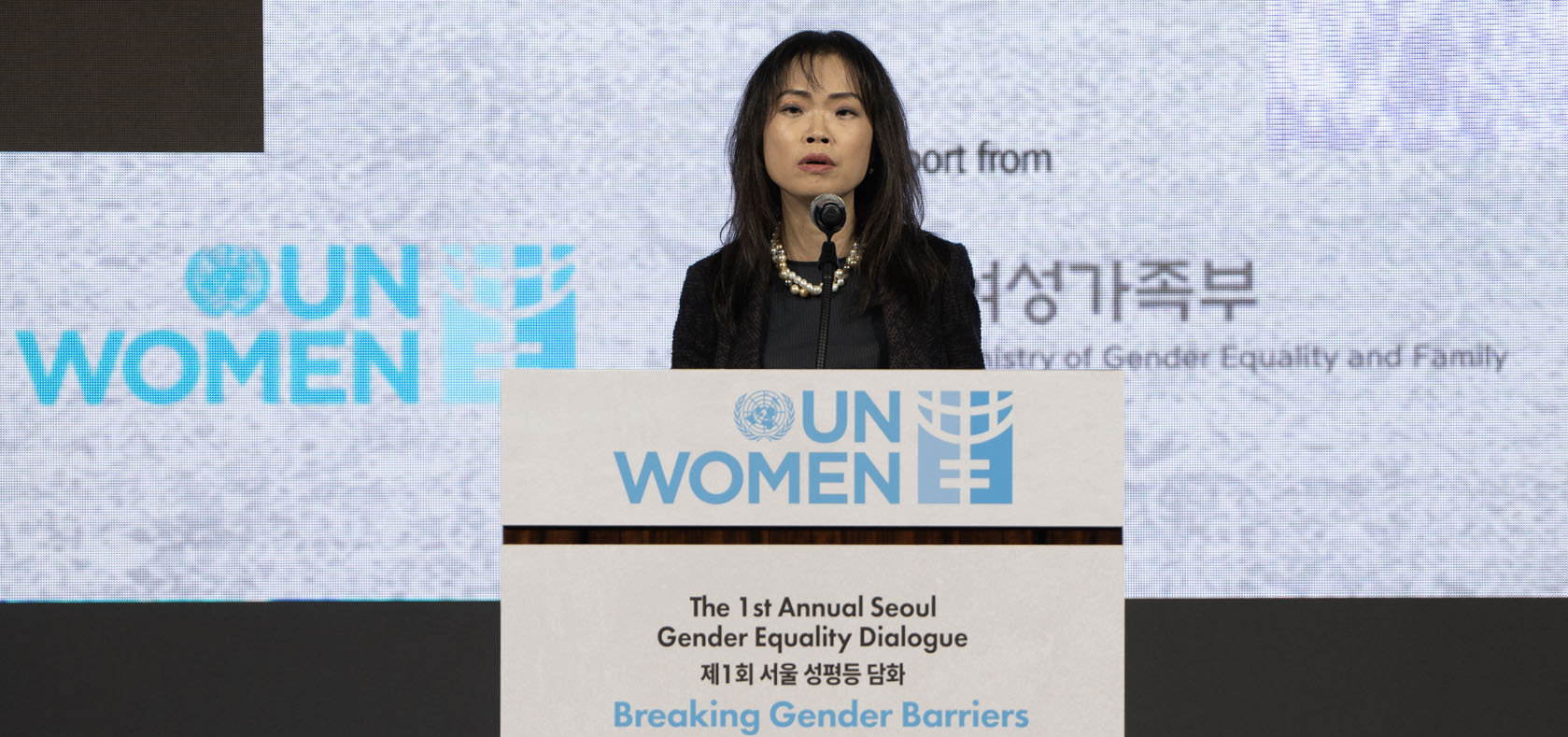
Diane Lin, Head of Investment for the Indo-Pacific and Middle East, Department for Business and Trade for the government of the United Kingdom delivering her talk. Photo: UN Women/Hanju Lee
As an Asian woman born in China and educated in Japan, Lin relied on her strengths and channeled her background into becoming fund managers in Australia, specializing in Asian equities investment. As one of the very few woman fund managers of her generation in Australia, she established the country’s first long and short equity hedge fund dedicated exclusively to Asia in 2008 which yielded positive returns even during the Global Financial Crisis, according to her.
At the Seoul Gender Equality Dialogue, speakers also highlighted various forms of gender biases that are deeply entrenched in their fields. For instance, Sandra Benson, Vice President of Industry Transformation at Procore Technologies, shared her 30-year-long journey in the infrastructure industry, and recounted that she faced challenges such as name-calling, harassment or even her manner of dress and daily office look. Sandra noted, “A woman does not have to sacrifice her femininity to be accepted in a male-dominated industry.”
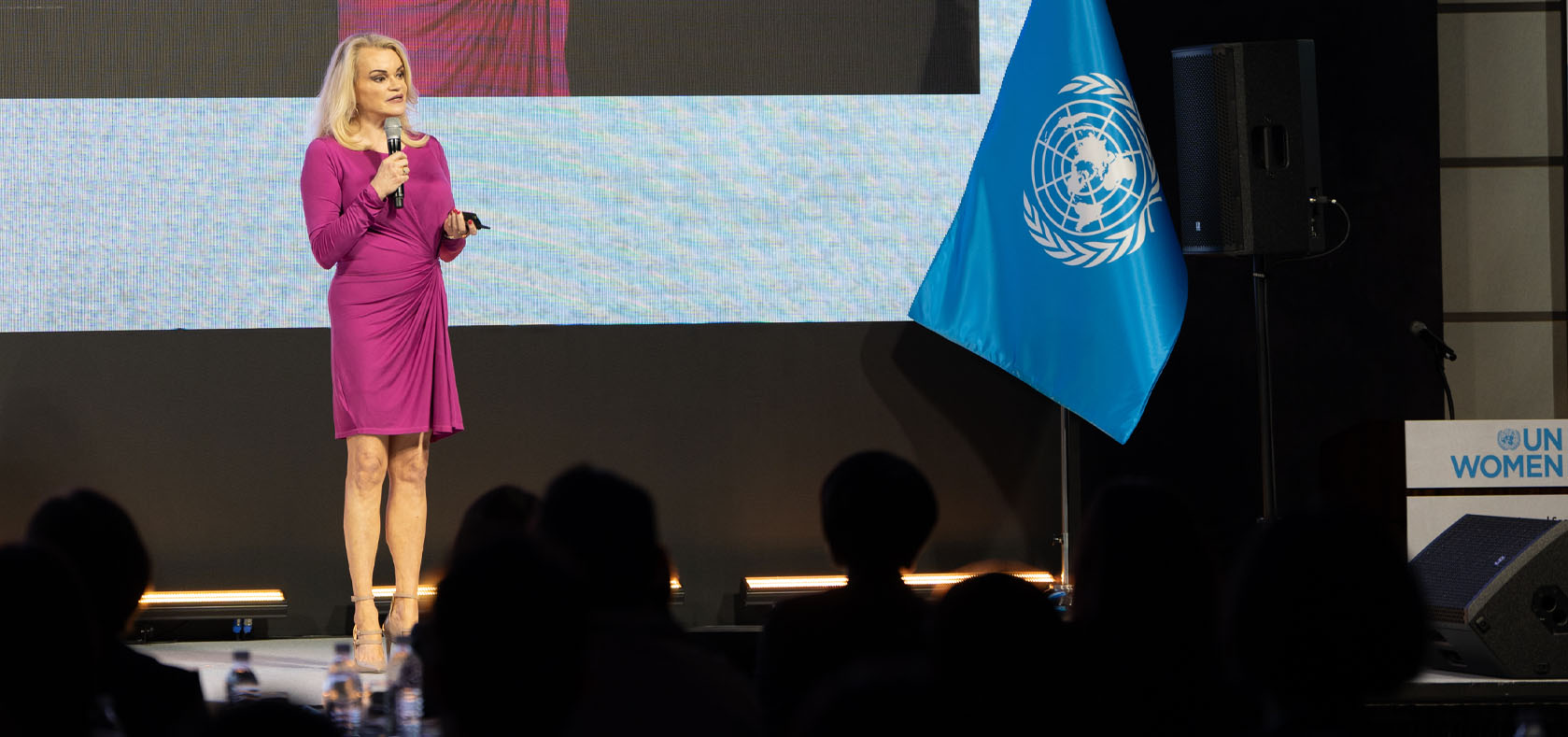
Sandra Benson, Vice President of Industry Transformation at Procore Technologies during her presentation. Photo: UN Women/Hanju Lee
She also suggested to remember: “Strong is not the same as aggressive. Choose your battles wisely.” Sandra is currently one of the top leaders in the field of construction as a board officer for the National Institute of Building Sciences (NIBS), which reports on the annual status and recommendations on the industry to the President of the United States of America.
The issue of gender bias was also addressed by Kiran Gupta, the prestigious CEO of Powerlinks Transmission (at the moment, now she serves as Chief - Customer Experience, Commercial & Govt. Affairs at Tata Power-DDL), an energy company based in India. "The issue of accepting women as leaders still persists [in our industry]. Colleagues sometimes do not follow women’s guidance or share uncomfortable [comments]. What we need to do then is to remain focused, stay self-driven, and persevere,” she noted.
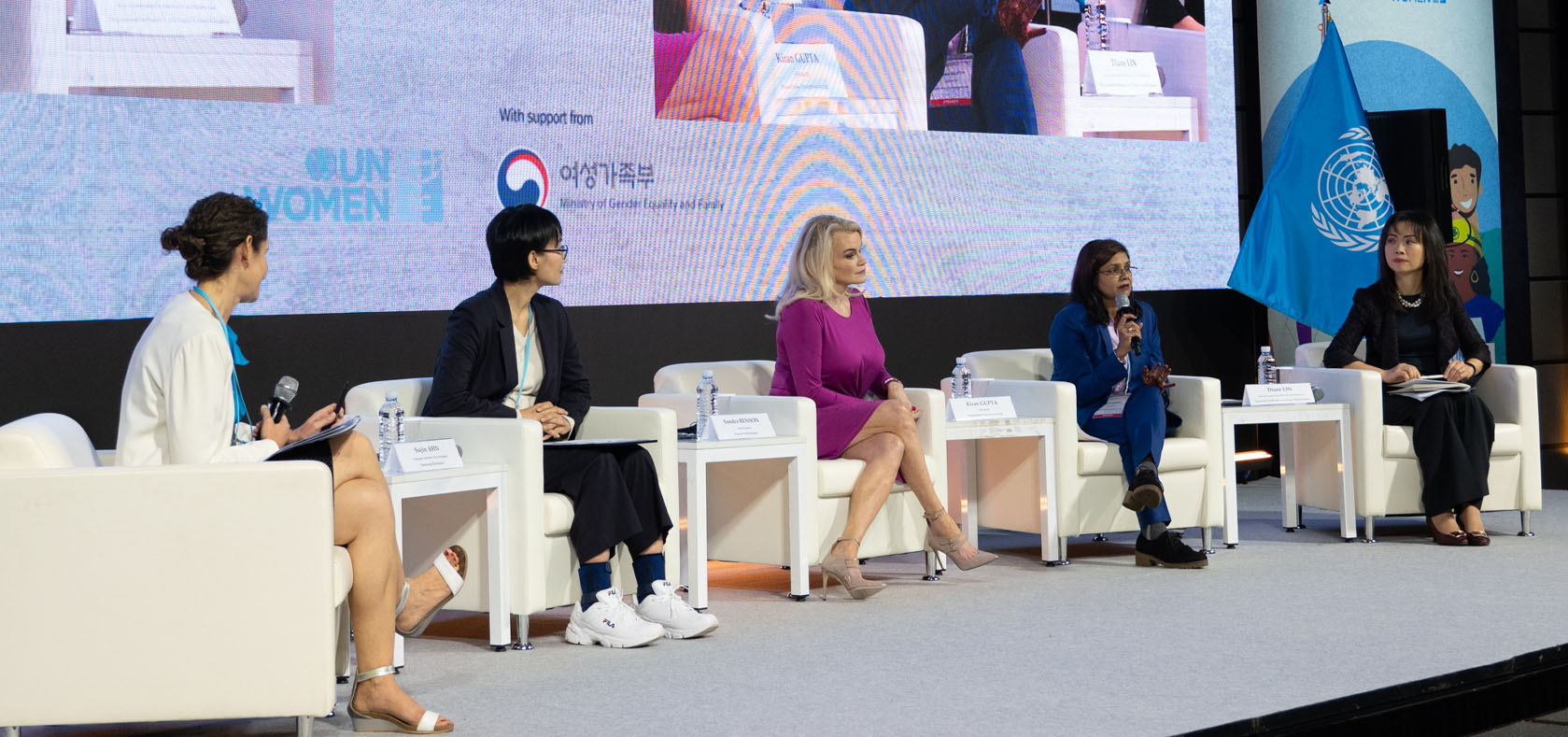
Kiran Gupta, CEO of Powerlinks Transmission (at the moment), participates in a panel discussion with other women leaders. Photo: UN Women/Hanju Lee
Gender bias was highlighted as being prevalent in the Korean construction industry as well. The panel members from the Korea Women’s Society of Architects recounted their experiences facing the perception that women simply do not “fit in” at construction sites. Proving this viewpoint to be false , the panelists (Kisook Park, Chairperson of Yoo-jung Park, Principal Professional in the Landscape CE Team at SAMSUNG C&T; Sejin Kim, Senior Manager in the Facility Management Team at the Seoul Power Generation Site Division of Korea Midland Power; and Hara Jeong, Manager of the Infrastructure Contract Management Team at Hyundai Engineering & Construction) proudly showcased their achievements in mega-construction projects and demonstrated the practical added value they bring to the industry, such as generating innovative ideas, ensuring safety measures, and designing gender-responsive building structures.
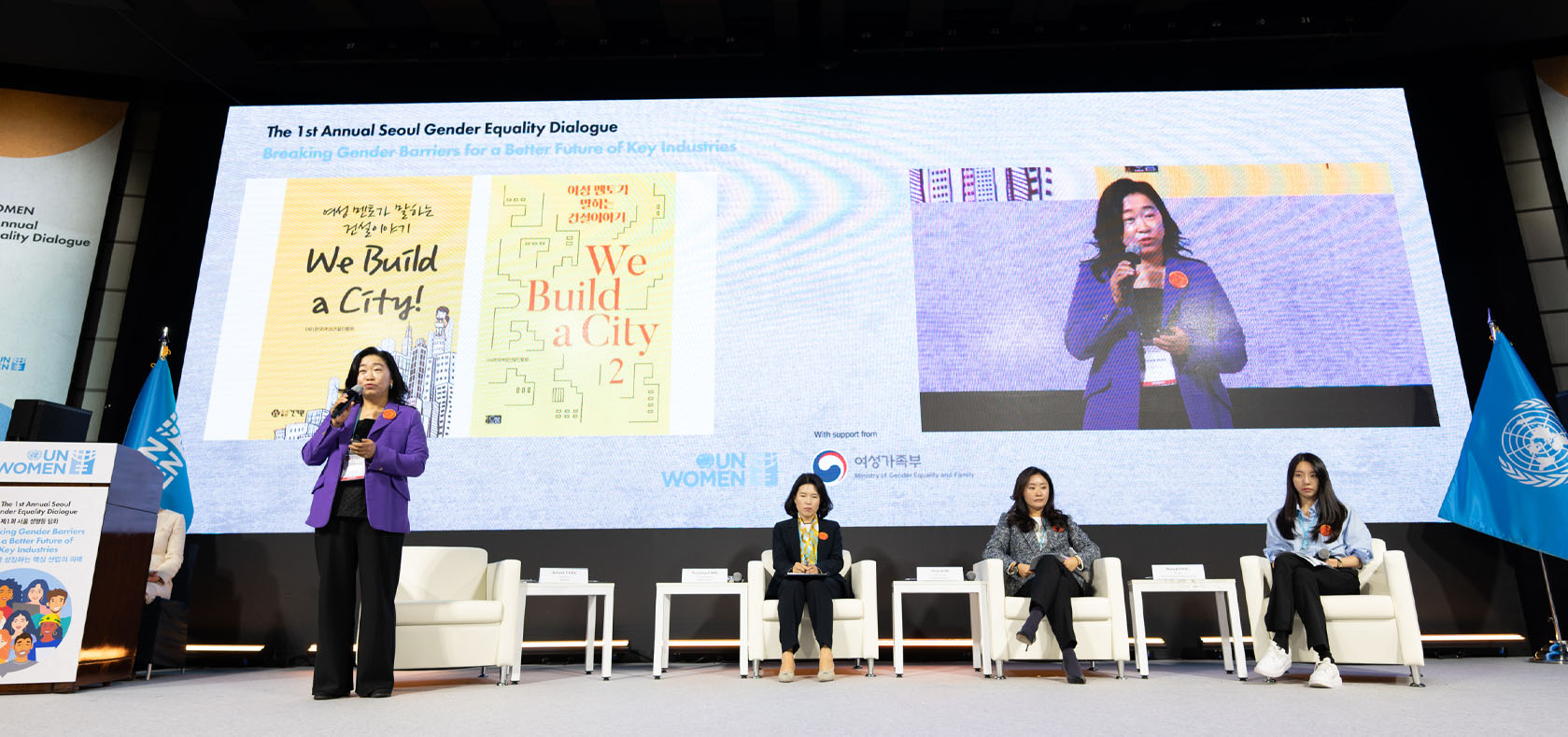
Panelists at the Korea Construction Sector session. From left to right, Kisook Park, Chairperson of Yoo-jung Park, Principal Professional in the Landscape CE Team at SAMSUNG C&T; Sejin Kim, Senior Manager of the Facility Management Team at the Seoul Power Generation Site Division of Korea Midland Power; and Hara Jeong, Manager of the Infrastructure Contract Management Team at Hyundai Engineering & Construction. Photo: UN Women/Hanju Lee
Speakers also emphasized the importance of supporting policies to nurture happier and more productive women leaders in the future. “Key industries should not only welcome women but also champion flexible working arrangements, enabling a harmonious balance between professional and family life,” Lin noted. “For my generation, achieving career success required [ …] significant sacrifices, [but] I hope that people today no longer have to choose either career or family.”




